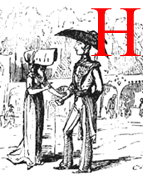
How did atheist, secularist, and humanist ideas circulate within and across nations in the long nineteenth century? This conference seeks to consider this question at both micro and macro scales, exploring the local, national, and international networks that enabled freethought to flourish. The nineteenth century was a period during which developments across physical and social sciences, politics and activism, technology and travel gave rise to new ways of conceiving the universe and humanity’s place within it. While it is abundantly clear that this did not lay an uncomplicated path towards secularisation, there were many individuals who through their lives, writings, and actions sought to establish a secular age.
The question of terminology is often fraught and, as Nathan Alexander (2019) observes, the terms used to frame the field of historical unbelief can often serve to reinscribe particularly Western concerns. Although the category of freethinker (or Freidenker, libre-penseurs, fritänkare etc.) is not exempt from such difficulties, we use it is a multivalent term that speaks more broadly to the freedom of thought, speech, and action that liberation from religious frameworks can instil. Furthermore, it was used in the nineteenth century to encompass a range of positions, from militant, antagonistic atheists to those with pantheist and deist beliefs that sit outside traditional religious frameworks, via many forms of doubt and agnosticism.
There has been a tendency for Anglophone freethought to be considered separately from European traditions, and both are often cut off from, and can overshadow, wider global currents. Recently, significant steps have been taken in making connections across such boundaries through edited collections such as the internationally orientated Cambridge History of Atheism, ed. by Stephen Bullivant and Michael Ruse (2021), and Freethinkers in Europe: National and Transnational Secularities, 1789−1920s, ed. by Carolin Kosuch (2020). This conference builds upon such publications, and as such we warmly welcome proposals which explore how freethought discourses in the period c.1789–1914 operated on a global scale, and how the legacies of these persisted across the twentieth century and through to the present.
This will be a multidisciplinary conference, with contributions welcomed from those working in the fields of history, literature, art history, politics, religious studies, sociology, anthropology, law, media studies and so on. Topics might include, but are not limited to:
- Class and sociocultural divides
- Deism, pantheism, and alternative theist traditions
- Freethinking communities and societies
- Freethought and gender
- Freethought press and popular media
- Freethought spaces and practices
- Freethought, the state, and the law
- Global and transnational networks and exchanges
- Humanism
- Morality and ethics
- Race and empire
- Radicalism and militancy
- Science and freethought
- Sex and relationships
- Socialism and communism
- The art, literature, and music of freethought
- The conceptual history of unbelief
- The legacies of nineteenth-century freethought
The conference will be held on Friday 9 and Saturday 10 September 2022 at Queen Mary University of London. It is funded by the Leverhulme Trust and organised in partnership with the International Society for Historians of Atheism, Secularism and Humanism and Humanists UK.
Please submit a 300-word proposal for a 15-minute paper plus a 50-word biography in Word format to c.stainthorp@qmul.ac.uk by Tuesday 1 March 2022. We are also interested in proposals for panels or presenting work in alternative formats, please get in contact directly to discuss these prior to submission.
Last modified 23 February 2022